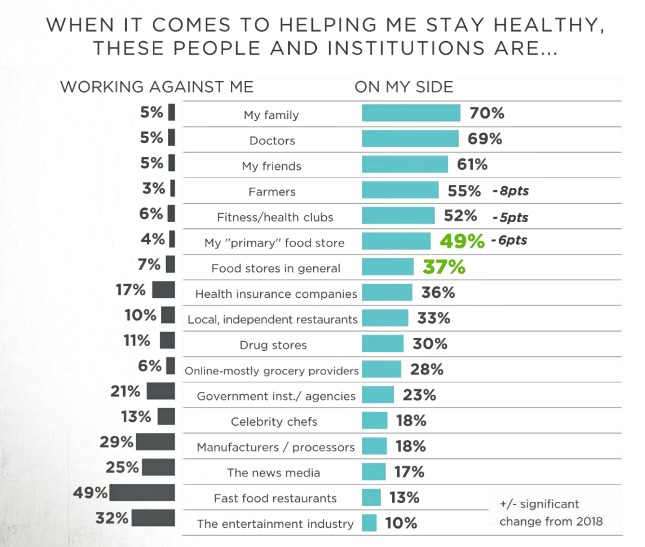Picture of Health
The decade-old health & wellness movement has morphed in response to the pandemic — just like everything else we can think of. Large, national consumer surveys paint a picture of the current consumer as “on the lookout for health claims”,[1] with nearly 8 in 10 “wanting to do more to stay healthy in the future”.[2] Actual purchase behavior suggests they are true to their word as evidenced by explosive sales of supplements,[3] as well as any other food or beverage item associated with physical or mental stamina in this ‘new normal’. Even pre-Covid, 6 in 10 U.S. consumers equated eating well with “foods and beverages with specific benefits for my body”.[4]
But which benefits do they seek? New research suggests that future purchase decisions will be impacted by several key claims: gut health (see our April article “Trust Your Gut”), cognitive health, mental health, and the ability to sleep,[5] manage weight,[6] incorporate more plants,[7] and boost immunity. Sadly, research also suggests that less than one-half of consumers find the industry helpful in their pursuit of health. Case in point, roughly 4 in 10 believe grocery retailers are “on their side when it comes to staying healthy”, a number which drops to 3 in 10 for local, independent restaurants, 2 in 10 for celebrity chefs, and as low as 1 in 10 for fast food establishments.[8]:

So how do we improve consumer perception? Make them feel we are partners in wellness? Outside of optimizing actual SKUs and portfolios, we believe there are two key areas for improvement: product education and navigation — and we have some ideas.
First, consider icons. Graphic symbols can quickly guide consumer choice. In food and beverage, icons are often used on packaging and menus to communicate everything from certification (e.g., cruelty-free bunny) to spiciness level (e.g., a red pepper) to health benefits (e.g., a heart). We see an opportunity to develop symbols that represent consumer’s new health goals.
Second, menu experimentation. Consider creating dishes and drinks that revolve around newly popular health benefits and the ingredients known to deliver them.
We believe that as health needs become more fragmented and complex, simple cues and tailored solutions will help break through the clutter and communicate a higher level of care.
[1] “A healthy interest”, Quirk’s Marketing Research Review, July/August 2020
[2] “Consumer trends shifting toward health and wellness, ADM finds”, FoodDive, 9/03/20
[3] “Dietary supplement usage changes & increases during pandemic, says new Ipsos-CRN survey”, NutraIngredients, 8/20/20
[4] “U.S. Grocery Shopper Trends” FMI, 2019
[5] “Consumer desire for ‘resiliency’ during pandemic opens door for functional products, says Hartman Group”, Food Navigator, 9/02/20
[6] “ADM spotlights six emerging health and wellness trends from gut health to immune function”, Food Navigator, 9/08/20
[7] “Healthy food on the menu as coronavirus improves eating habits”, FoodDive, 7/01/20
[8] “U.S. Grocery Shopper Trends, FMI, 2019
